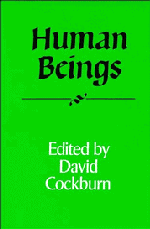Book contents
- Frontmatter
- Contents
- Introduction
- Machines as Persons?
- The Importance of Being Human
- Response to McNaughton
- Response to Diamond
- Real Selves: Persons as a Substantial Kind
- Personal Identity and Brain Transplants
- Personal Identity and the Idea of a Human Being
- Imagination and the Sense of Identity
- Radical Critique, Scepticism and Commonsense
- Getting the Subject back into the World: Heidegger's Version
- Incarnational Anthropology
- How Many Selves Make Me?
- Sartre and Our Identity as Individuals
- Bibliography
- Notes on Contributors
- Index
Radical Critique, Scepticism and Commonsense
Published online by Cambridge University Press: 05 February 2015
- Frontmatter
- Contents
- Introduction
- Machines as Persons?
- The Importance of Being Human
- Response to McNaughton
- Response to Diamond
- Real Selves: Persons as a Substantial Kind
- Personal Identity and Brain Transplants
- Personal Identity and the Idea of a Human Being
- Imagination and the Sense of Identity
- Radical Critique, Scepticism and Commonsense
- Getting the Subject back into the World: Heidegger's Version
- Incarnational Anthropology
- How Many Selves Make Me?
- Sartre and Our Identity as Individuals
- Bibliography
- Notes on Contributors
- Index
Summary
Suppose that someone writes an argument on a blackboard which leads to the conclusion that he may, at that time, be dreaming. He goes over it, considers its validity, the truth of its premises, its assumptions and so on, and then to his dismay, he judges that he is compelled to conclude that he may be dreaming. He goes over the argument repeatedly and carefully, but finds the conclusion ‘inescapable’. If reviewing the argument on the blackboard may be taken as an analogue of reviewing thoughts before one's mind, then his condition seems like the condition which Descartes describes at the beginning of the Second Meditation: ‘The meditation of yesterday filled my mind with so many doubts that it is no longer in my power to forget them. And yet I do not see in what manner I can resolve them; and just as if I had all of a sudden fallen into very deep water, I am so disconcerted that I can neither make certain of setting my feet on the bottom, nor can I swim and support myself on the surface.’
One could think of this as an example of intellectual purity, of a mind struggling in obedience to Reason's claim upon it; courageously prepared to follow an argument wherever it may go; determined to embrace the truth irrespective of how unpalatable it may be. That is a common way of thinking of it.
- Type
- Chapter
- Information
- Human Beings , pp. 157 - 172Publisher: Cambridge University PressPrint publication year: 1991

